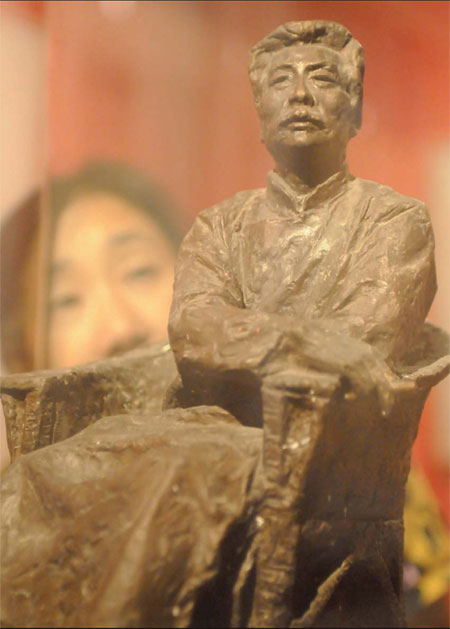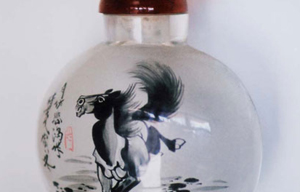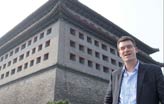Literary beacon
Updated: 2011-09-23 11:46
By Chitralekha Basu, Yang Guang and Mei Jia (China Daily European Weekly)
|
 Lu Xun was driven by anxiety about China's present and future. [Provided to China Daily] |
Seventy-five years after his death, the works of lu xun continues to resonate
Lu Xun is easily the most recognizable face of 20th century Chinese literature, the world over. He would have been 130 this Sunday, but in Chinese popular imagination, as indeed elsewhere, it is the image of a 50-ish Lu Xun - scruffy-haired, mustachioed, square-jawed and imbued with a steely, almost-unnerving, gaze - that has endured. In Lu's case, the image becomes the writer. In fact, the role Lu played in public life has often taken precedence over his writing, feeding into his iconic aura.
Be it the bold step of snipping off his queue (the braid Chinese men wore as a token of deference to Manchu rule, 1644-1912) as a young language student in Tokyo, or openly defying his boss, the minister of education, when several of his students were killed by the warlord government at a peaceful demonstration in Beijing in 1926, Lu's actions were a public example of extraordinary courage and moral rectitude.
He was hero material - feisty, rebellious, a somewhat controversial lover who walked out of his marriage to be with a woman 16 years his junior, a firm believer in left politics who fought relentlessly with the orthodox members of the Communist Party of China and a totally dedicated writer, driven by a restless moral anxiety about the country's present and future.
But that was then. This was a China ravaged by a century and a half of foreign aggression since the Opium Wars (1839-42) and riddled with internal strife, with no decent literature that might connect with the people, let alone inspire them to work toward building a national identity (as the reformist Liang Qichao, 1873-1929, famously said, "Chinese novels teach us either robbery or lust"). The scene was begging for the arrival of a Lu Xun. And Lu, a medical student in Sendai, Japan, threw away his surgeon's scalpel to pick up the pen and respond to that call. The rather dramatic turnaround came about after he had watched an image from the Russo-Japanese War (1904-1905), of a Chinese man, a suspected Russian spy, being beheaded by Japanese soldiers as a crowd of Chinese stood by, watching passively.
At a time when China enjoys relative prosperity and is evidently in the reckoning as a global leader, could Lu Xun's idea of using writing "to cure the nation's diseased mind" have made it past its sell-by date? Is he just a metaphor of language reform in the early 20th-century, the man who invested the language of everyday speech with the dignity of literary use? A "literary giant" against whom all the Chinese writers who followed must be measured, some times a tad uncomfortably? Earlier this year I asked the 20-something bestselling author Zhang Yueran if she shared a similar moral concern as Lu's about the nation's future. Zhang said she was engaged with different themes. Fair enough.
Not so the writer Li Er, whose unsparing, often jarring, description of the macabre and predilection for fantasy are, some times, reminiscent of Lu. "While writing Truth and Variations, I did try writing about 3,000 words imitating Lu's diction. It's my tribute to him," he says.
Li sees Lu as a repository of pain - "he was the most pained person in modern China". Dogged as he was by "pain, depression and nihilism", Lu "never gave up hope", Li hastens to add. "This is what is worth emulating today."
Lu's skepticism, feels Canaan Morse, a prolific translator and a publishing consultant with Paper Republic, a website dedicated to disseminating Chinese literature in translation, may be a useful tool for writers, especially now.
"Lu was a thoroughgoing skeptic, which is one reason his insight was so penetrating and his literary acumen so sharp," he says. "Nothing was sacred and no one was spared. That he also had the guts to put his insights into print was commendable."
A lot of that cynicism was, in fact, directed at oneself. As Julia Lovell points out in her extremely succinct introduction to The Real Story of Ah-Q and other Tales of China: Complete Fiction of Lu Xun (Penguin Classics), Lu Xun "draws himself and his audience into the crowd of numb spectators" who seem to be in passive collusion with the ineffectual government that might be held responsible for people's suffering.
"Reading Lu Xun is actually a way of interrogating ourselves," says Sun Yu, former director of Beijing Lu Xun Museum and dean of College of Liberal Arts, Renmin University of China. "The works Lu Xun wrote and translated are almost all eruptions of his innermost thoughts."
But then, he points out, to get to the core of Lu's "innermost heart" may not be an easy task. "The older he gets, the more he realizes he has departed from the old ways of expression. His translation gets more bitter and obscure. In terms of thoughts and aesthetics, Lu has always been other than normal."
The author, who may seem obscure in parts to native Chinese, seems to have gained a wider reach with an English-speaking audience since the Penguin translation came out in 2009.
"I've received letters from English professors who've appreciated adding Lu to their canon of great 20th-century writers of short fiction," says Julia Lovell, the translator. "I've also had correspondence with people without any background in Chinese or literary studies who read the stories and found that the tableaux of Lu's Shaoxing childhood reminded them of their own."
The youth in China, however, often connect with Lu, who died in 1936, at a different level. Introduced to works such as Dawn Blossoms Plucked at Dusk, a collection of reminiscences, as early as in junior high school, youngsters often end up naming each other after the archetypal characters in Lu's fiction - Ah Q, the bumbling and mischievous village idiot, Xianglin, the whining, long-suffering, exploited housemaid, Kong Yiji, a hard-drinking wastrel and a thief, forever waiting to clear his imperial examination.
"My mother used to call me 'Aunt Xianglin', mocking me for repeating words and talking too much," says Dai Anmei, a second-year student in a senior high school in Chengdu. "I always wanted to know who Xianglin was." When she did discover her in the story New Year's Sacrifice, it wasn't a particularly happy experience. Following the listless death of a poor woman, a victim of ruthless social apathy, to the bitter end was anything but pleasant.
But the next time round, Dai approached the story with a better sense of perspective. "I feel lucky to be born and brought up in a new time. Chinese society has become more open and developed. We're way better than in the past," she says. "Lu's works make us aware of the value of the life we have, and teach us to respect the progress this country has made."
Her classmate Li Wei agrees that Lu offers an invaluable key to decode China's history. "By exposing the darkness in the society in the past and the ignorance of the people at that time, Lu guides us as to what we might keep and what ought to be abandoned."
And no, she would not want to emulate his writing style.
"But I appreciate his cold humor, which magnifies the impact of the shock and leaves more space for mulling on its significance," she says.
Li Shi, who has been teaching Lu Xun at the school for 26 years, has tried adapting modern teaching methods in sync with the times.
"I played a movie based on New Year's Sacrifice (a version featuring Bai Yang) to complement the teaching. While previously students would giggle and get taken up with irrelevant details, they showed a strong emotional involvement while watching this one. They understand the struggle of the hapless woman Xianglin and were fully engaged by the story."
It's a gift they are learning to appreciate early on.
E-paper

The snuff of dreams
Chinese collectors have discovered the value of beautiful bottles
Perils in relying on building boom
Fast forward to digital age
Bonds that tie China. UK
Specials

Let them eat cake
Cambridge University graduate develops thriving business selling cupcakes

A case is laid to rest
In 1937, a young woman'S body was found in beijing. paul french went searching for her killer

Banking on change
Leading economist says china must transform its growth model soon
